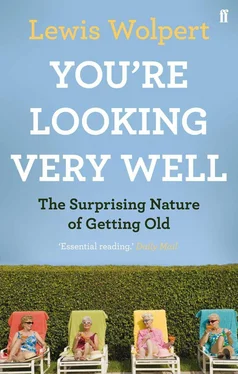With mental activities, there is usually a much less dramatic decline with age than with physical activities. It varies a great deal, but the old can still be very productive. Politicians can continue to be active until rather old, some might say too old. Roman emperors ruled until they were of extreme old age. Augustus, who lived until the age of 76, remained in office until his death and didn’t stop visiting the Senate on a regular basis until he was 74. Winston Churchill was still prime minister at the age of 80.
Scientists usually do their best work when young, but there are important exceptions, such as Galileo writing Dialogues Concerning the New Sciences when he was 72. The physicist Max Planck wrote: ‘Scientific theories don’t change because old scientists change their minds; they change because old scientists die.’ It has been found that science professors in their 50s and 60s published almost twice as many papers each year as those in their early 30s. When he was 80, André Gide said that he did not detect any weakening of his intellectual powers but did not know what to turn them to.
Writers, painters and sculptors do not lose their skills with age, and many have produced their finest works in the last fifteen or so years of a long life. At 97, Enrico Paoli, an Italian chess master, was the strongest active nonagenarian chess player in the world. He learnt chess when he was nine and started playing tournaments at 26. He won his last Italian championship title at the age of 60. Paoli was playing master-level chess at 96—in 2003 he played the international tournaments. Jose Raul Capablanca, the ‘Mozart of chess’, regarded Emanuel Lasker, who was world chess champion for 27 years, as the most dangerous player in the world in a single game, even as the latter neared 70. No other contemporary, he thought, surpassed him in his ability to evaluate a position and find the correct strategy.
The decline of memory with age depends on the specific nature of the memory, as there are different types. For example a patient with a particular brain damage cannot recollect personal experiences, but can learn new motor skills and lists of words. This is an implicit memory and involves recall of motor and academic skills without conscious awareness of previous experiences. It is distinct from explicit memory, which involves recall of previous experiences and information. Explicit or episodic memory involves the memory of autobiographical events, including recent events, such as times, places and associated emotions and is the most common memory loss with age. As the length and complexity of sentences increases, older adults have more difficulty understanding and recalling them. Yet factual knowledge does not decrease with age, though spatial memory, such as the layout of a museum recently visited, does decline.
It is common with old age to forget names of people or to lose a particular word—even though it is on the tip of the tongue. Usually the name or word is recalled later when one is thinking about something quite different. I have lost names, so too have many of my friends. I have also forgotten the faces of people whom I know quite well and have to ask them who they are when they greet me, and then I recall who they are. It is a bit embarrassing not to recall the name of someone you know when you meet them and need to introduce them to someone else. One also loses common objects, or as Edward Grey put it: ‘I am getting to an age when I can only enjoy the last sport left. It is called hunting for your spectacles.’
Jonathan Swift, the author of Gulliver’s Travels , describes a familiar experience:
That old vertigo in his head
Will never leave him, till he’s dead:
Besides, his memory decays,
He recollects not what he says;
He cannot call his friends to mind:
He forgets the place where he last dined:
Plies you with stories o’er and o’er,
He told them fifty times before.
Though there is no significant loss of knowledge with age, the elderly do not encode information into long-term memory as efficiently as the young. Forgetting to do something as one ages is common and worrying. Around 60 per cent of participants in a study of those aged 75 and older forgot to perform an action that they had previously been requested to carry out. A typical example of loss of a recent memory is the case of a distinguished but ageing TV presenter who went out to dinner on a Friday night. When he rang the hostess’s bell there was a delay, then she put her head out of an upper window and said hello. ‘Have I come on the wrong night?’ he asked. ‘No,’ she replied, ‘it was last Friday and you were here.’ All too familiar.
* * *
Complaints about memory are the most frequent cause for seeking medical advice about dementia. This is the result of episodic memory going wrong and leads to forgetting personal and family events and appointments; losing items round the house; repetitive questioning; inability to follow plots on TV or in films; forgetting past events and news items; and getting lost. The elderly have many more memories for events that occurred in adolescence and early adulthood than in midlife. Very few elderly show improved cognitive functioning in the evening, and unlike the young, their performance gets worse through the day. The herbal treatment ginkgo, used by the Chinese for thousands of years to overcome loss of memory in the old, has been shown to be totally ineffective. All the fuss over fish oil as a key brain food may be unjustified. A two-year study found there is no evidence that the supplements offer benefits for brain function in older people, contradicting previous surveys on the wonders of omega-3 fatty acids. But physical fitness contributed to more than 3 per cent of the differences in cognitive ability in old age after accounting for a participant’s test scores at age 11.
About half of all lifetime cases of mental illness begin by age 14 but the chance of developing a mental disability increases as we age. The most common and serious one is dementia, an overall impairment in cognitive functioning sufficient to affect everyday activities, and there may be depression, hallucinations and delusions. The term dementia was introduced by Philippe Pinel in Paris in 1801; he also introduced the idea that people suffering from it should be treated with kindness—many patients at that time had actually been kept in chains—and he called this new principle ‘the moral treatment of insanity’. One of Pinel’s students, Dominique Esquirol, gave a very detailed and still valid description of dementia, pointing out, for example, that sufferers entertain perfect indifference to objects that were once most dear, and this includes relatives. They also often have a ridiculous passion. He carried out autopsies and noted abnormal convolutions in the brains of patients, but microscopic examinations of such brains had to wait for work on Alzheimer’s.
While dementia is rare before 60, it increases with age and is present in 5 per cent of the over 65s and in 20 per cent of the over 80s. Dementia isn’t a specific disease, rather it describes a group of symptoms affecting intellectual and social abilities severely enough to interfere with daily functioning. Different types of dementia exist, depending on the cause. Low education and diabetes can contribute, and mental and physical activity help prevent it. Alzheimer’s disease is the most common form of this disease, and is the cause in two thirds of cases of dementia. It increases the risk of dying by two to five times, and for those over 85 accounts for one third of deaths, though this is rarely on the death certificate. Staff who look after Alzheimer’s patients need to recognise it can be a terminal illness.
Dementia and normal ageing may be on a continuum. Memory loss generally occurs in dementia, but memory loss alone doesn’t mean there is dementia. It can be difficult to distinguish between onset of Alzheimer’s and ordinary ageing relapses of memory and cognition. Dementia has many causes and some dementias, such as Alzheimer’s disease, occur on their own, not as a result of another disease. Some dementias, such as those caused by a reaction to medications or an infection, are reversible with treatment. Recent research shows that up to 80 per cent of people diagnosed with mild mental or cognitive impairment go on to develop much more debilitating dementia within just six years. As well as the personal devastation caused by cognitive decline, it is also the single biggest reason why older people lose independence and require 24-hour care.
Читать дальше












